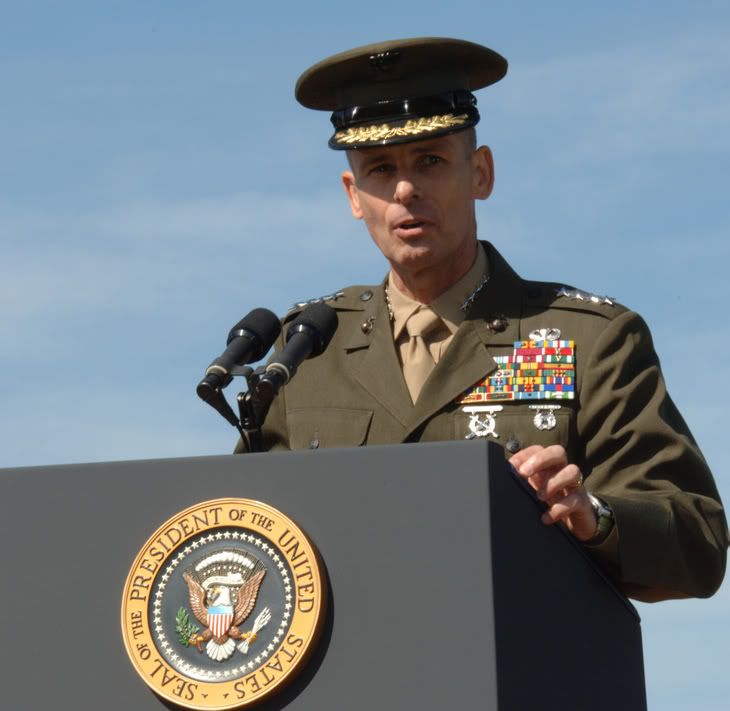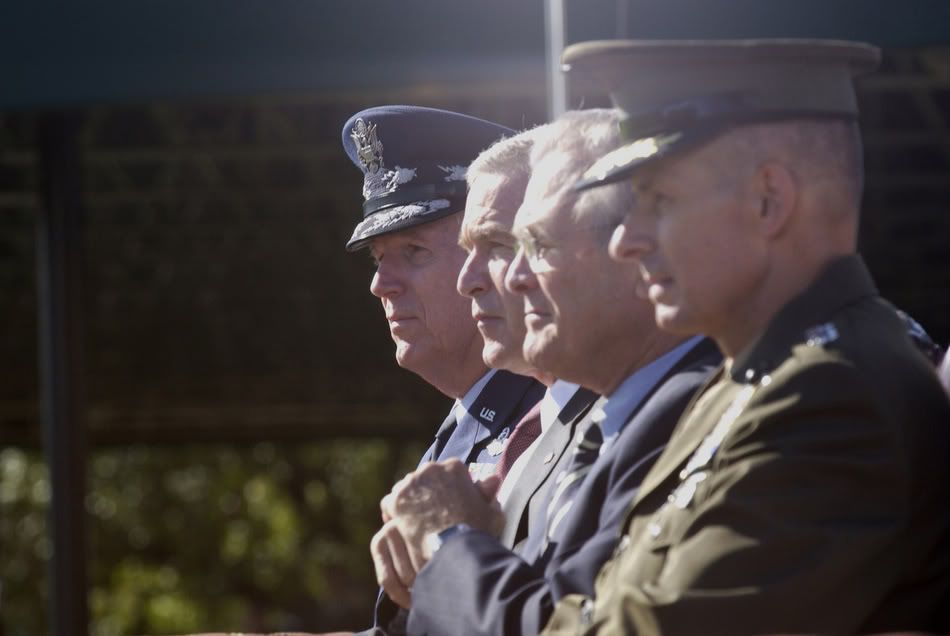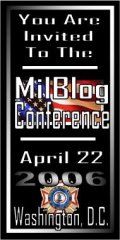New Chairman of the Joint Chiefs

I was doing some research for a post about Marine General Peter Pace, who assumed the role of Chairman of the Joint Chiefs of Staff Sept. 30th from General Myers. He gave a Guidance speech that has been quoted, but I've not found the entire text.
That's all well and dandy, but the rest of the quotes are just gobbledygook.
Pace's guidance is subtitled "Shaping the Future." He said that while the emphasis must be on the war on terror, the U.S. military must be ready for any eventuality.Pace's priorities are concise and mutually supporting. At the top is winning the war on terror.
"Our enemies are violent extremists who would deny us, and all mankind, the freedom to choose our own destiny," Pace wrote in the guidance. "Finding this distributed, loosely networked enemy is the greatest challenge we face."
The U.S. will meet and beat the enemy on the battlefield, but that is not enough, he said. Building better economies, encouraging good government and assisting governments as they live by the rule of law will help the world shape "an environment that precludes the flourishing of terrorism, much as a healthy body rejects the onslaught of disease."This sounds too much like what Dr. Phat Tony complained about today in Peace Keeping Sucks.
The United States must harness all elements of national and international power to stop terrorists and stop young people from wanting to join jihadist organizations. "My military advice to our nation's leaders will favor recommendations that integrate and coordinate our efforts with the work of others fighting this war," Pace wrote. "Through closer coordination within the Department of Defense and interagency (cooperation) we maximize the impact of our military power and build trust, synergy and momentum."
Then I come across an article in Military.com that starts off with:
WASHINGTON - Marine Gen. Peter Pace took over Friday as the military's top leader, facing an unpopular war in Iraq, recruitment shortfalls at home and the possibility of an expanded role in domestic disasters.WTF? I might expect that from the Wash. Post, but a Military site?
His leadership abilities will be tested as he leads a military that is stretched thin by conflicts in Afghanistan and Iraq, and - in the wake of devastating Hurricanes Katrina and Rita - that could be asked to take on an expanded role in natural disasters.What a load of crap! As far as recruiting is concerned, Greyhawk has an in depth analysis of that "crisis" that is NOT. And I'm getting impatient with members of Congress who expect the GWOT to be over with before the next campaign season begins. Get a grip.
Meanwhile, the Army has just ended one of the leanest recruiting years since it became an all-volunteer service three decades ago, missing its enlistment target by the widest margin since 1979.
With public support for the Iraq war waning and Congress' patience wearing thin, military leaders acknowledged Friday that shifting Iraq's security to its own forces is taking longer than expected.
Congress has just five words for Pace, House Armed Services Committee Chairman Duncan Hunter, R-Calif., said Friday in an interview: "Tell it like it is."
In an interview with Jim Lehrer on March 31, 2003, Lehrer is questioning Pace about the vaunted Republican Guard and how well our forces will stack up to them. Pace says:
We would like them to surrender. It's their choice. If they fight, they will die. If they surrender, they can have the opportunity to participate in rebuilding a free Iraq, an Iraq that is not a threat to Americans, an Iraq that does not have weapons of mass destruction, an Iraq that is governed by its own people, uses its own resources for the betterment of their own people. So I would say the soldier who are in the Republican Guards right now, you have a choice. You can surrender and be part of the future or you can die in place.That's what I like to hear. As to the changes he envisions, one that will directly affect the numbers is job specificity. He sums it up:
we have identified about—we meaning the services—have identified about 100,000 jobs that currently reside either in the active force or in the Reserve force and need to switch places. So without making the Guard and the Reserve any bigger or smaller, without making the active force any bigger or smaller, but simply by switching positions—examples: take some artillery out of the active force and put it in Reserves; take some civil affairs folks out of Reserves and put them in the active force, as examples—you can have a better balanced force for the kinds of capabilities that, as you look out five, ten, fifteen years, we think we’re going to need more of if we have to go do these kinds of things for our country.From the same interview, he gives his summation of what the President, any President, is for him as a leader:
The commander in chief, regardless of what prior service or non-prior service he has, starts active duty the day he takes the oath as president. And for however many number of years he is our commander in chief, he is on active duty with your armed forces. It makes no difference to guys like me whether he has had 10 years of experience or no years of experience. When he becomes commander in chief, he has the unbelievable responsibility of protecting this country. He has the absolute loyalty of all the armed forces of the United States from the day—the instant he swears himself in—he swears in as president of the United States and takes that oath as our commander in chief. And he accumulates active duty time every day he’s our president. And whether that’s four years or eight years as president, regardless of who the president is, that’s what counts. And what came before is of interest, but it has nothing to do with who the commander in chief is and who the president is, and the loyalty he deserves and gets and will always have from your armed forces.I like the way this guy thinks. He's going to do a good job.















<< Home